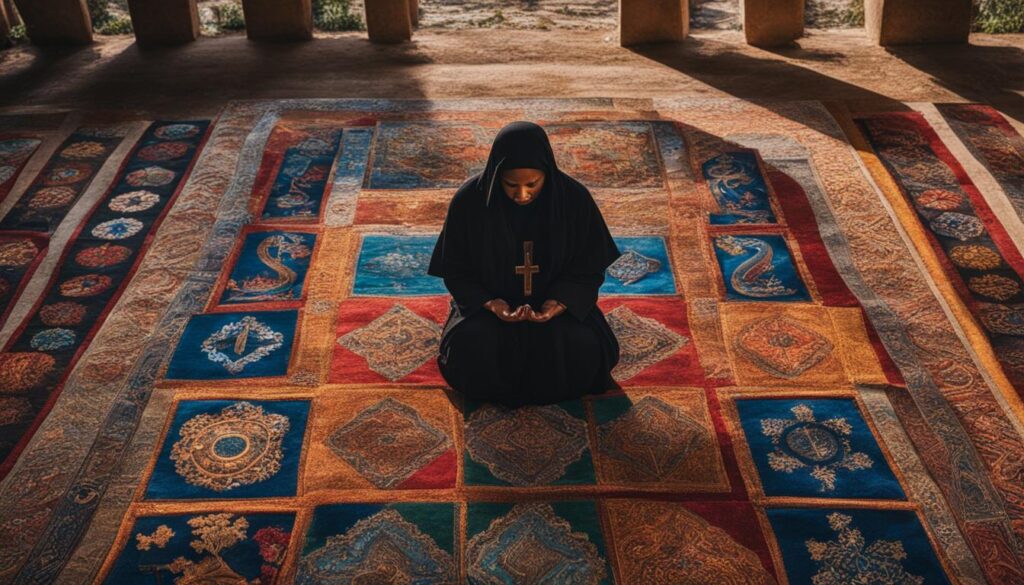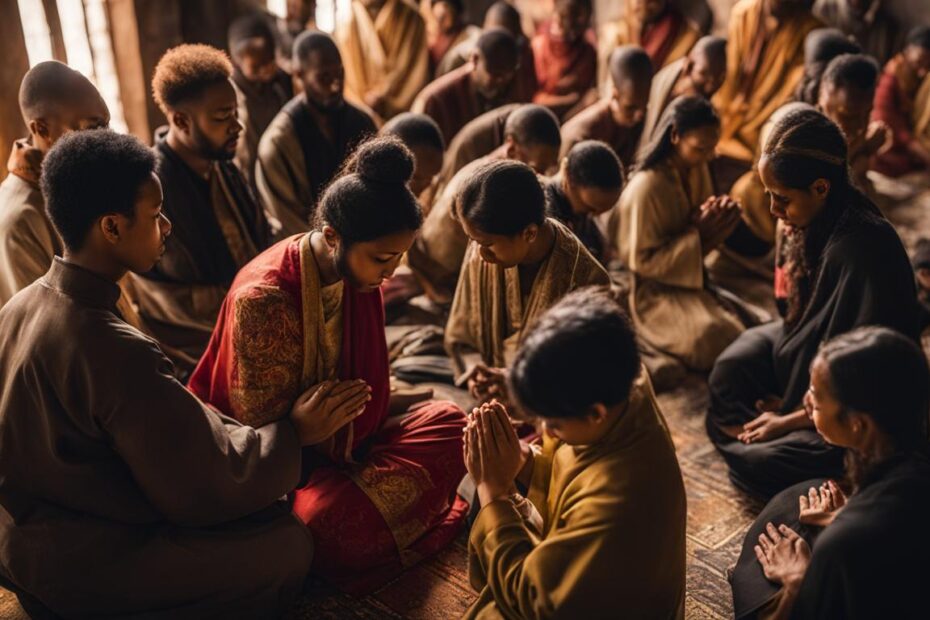Prayer plays a vital role in cross-cultural unity, allowing people of different cultures and religions to come together in their pursuit of a spiritual connection. It involves diverse prayer methods, interfaith prayer practices, and inclusive prayer traditions. The power of prayer has been recognized in various studies and research, showcasing how it can bring people from different backgrounds together and foster a sense of unity.
Key Takeaways:
- Cross-cultural prayer promotes unity among diverse cultures and religions.
- Interfaith prayer practices help build connections and address social issues.
- Multicultural prayer gatherings embrace diverse religious practices from around the world.
- Prayer strengthens individuals engaged in cross-cultural service and mission work.
- Prayer serves as a pathway to personal transformation and understanding.
The Power of Interfaith Prayer in Building Unity
Prayer has long been recognized as a unifying force among diverse groups of people, fostering a sense of connection and harmony. In the context of cross-cultural interactions, interfaith prayer holds particular significance, transcending religious boundaries and promoting cross-cultural spirituality. Research has shown that interfaith prayer can be a powerful and binding force, helping individuals from different backgrounds discover common ground and feel connected.
Interfaith prayer practices encompass a wide range of diverse prayer methods that reflect the cultural and religious traditions of various communities around the world. These global prayer rituals provide opportunities for individuals to come together, transcending their differences and embracing cross-cultural spirituality. Whether it is through prayer vigils or joint worship services, interfaith prayer serves as a transformative practice that builds bridges and fosters unity.
“Interfaith prayer practices, such as prayer vigils, are used regularly to unite communities and address social issues.”
The Importance of Bridging Prayer Practices
Studies have found that the greater the diversity within a group, the more likely they are to engage in bridging prayer practices. These practices go beyond individual beliefs and traditions, focusing on the shared values and aspirations of the community at large. Bridging prayer practices create a space for dialogue, understanding, and collaboration, promoting cultural exchange and appreciation.
Through interfaith prayer, individuals have the opportunity to learn from one another, gaining insights into different religious and cultural perspectives. This exchange of ideas and experiences fosters empathy and respect, breaking down barriers and promoting cross-cultural unity. By embracing diverse prayer methods and engaging in global prayer rituals, individuals can embark on a journey of spiritual growth and interconnectedness.
| Benefits of Interfaith Prayer in Building Unity |
|---|
| Facilitates dialogue and understanding among diverse communities |
| Promotes empathy, respect, and acceptance of different religious and cultural traditions |
| Strengthens relationships and fosters interconnectedness |
| Helps address social issues and promote positive change |
Overall, interfaith prayer plays a vital role in building unity across cultures by fostering dialogue, empathy, and understanding. By embracing diverse prayer methods and participating in global prayer rituals, individuals can cultivate a sense of cross-cultural spirituality that transcends religious boundaries and promotes harmonious coexistence. Through interfaith prayer, we can bridge the gaps that separate us and celebrate the rich tapestry of cultures and beliefs that make our world diverse and beautiful.
Inclusive Prayer Practices for Multicultural Gatherings
Multicultural prayer gatherings provide a unique opportunity for individuals from diverse backgrounds to come together and engage in inclusive prayer practices. These gatherings celebrate the religious practices around the world, showcasing the rich tapestry of diverse prayer methods used by different cultures. By embracing and incorporating these various traditions, multicultural prayer gatherings foster unity, understanding, and respect among participants, regardless of their religious affiliations.
These inclusive prayer practices create a welcoming environment that encourages individuals to share their own unique prayer traditions while learning and appreciating the practices of others. It offers a space for individuals to connect with one another on a deeper level, promoting interfaith dialogue and fostering cultural exchange. Through the act of prayer, participants develop a greater sense of empathy, recognizing the shared human experience despite the differences in beliefs and rituals.
At multicultural prayer gatherings, participants can engage in a variety of prayer methods that reflect the diversity of expressions found worldwide. From silent meditation to communal chanting, each practice brings a distinct flavor and spiritual experience. These inclusive prayer practices encourage individuals to broaden their perspectives, challenge their preconceptions, and open their hearts to new ways of connecting with the divine.
Inclusive Prayer Traditions from Around the World
Here are some examples of inclusive prayer traditions from various cultures around the world:
| Tradition | Description |
|---|---|
| Zikr | A Sufi tradition of repetitive chanting and remembrance of God, practiced in Islamic communities. |
| Prayer Flags | Tibetan Buddhists hang colorful flags inscribed with prayers and mantras to spread positive energy and promote harmony. |
| Smudging | A Native American practice of burning sacred herbs to cleanse the energy and create a sacred space. |
| Meditative Prayer | Incorporated in many spiritual traditions, meditation is a practice of stillness and inner reflection to connect with the Divine. |
| Chanting | Found in various religious traditions, chanting is a rhythmic repetition of sacred words or phrases to invoke a spiritual state. |
These are just a few examples of the diverse prayer methods that can be experienced and celebrated in multicultural prayer gatherings. The beauty of these inclusive practices lies in their ability to transcend cultural boundaries and connect individuals from different backgrounds in a shared spiritual experience.

The Role of Prayer in Cross-Cultural Service
Prayer plays a crucial role in cross-cultural service and mission work. It serves as a spiritual discipline that guides individuals towards unity with the Holy Spirit and strengthens their commitment to the work they undertake. By integrating prayer into their daily lives and practices, individuals engaged in cross-cultural service demonstrate their dedication to spiritual growth and their connection with God.
Through the act of prayer, individuals navigate the challenges and uncertainties they may encounter in their cross-cultural journey. It serves as a source of guidance, providing clarity of purpose and direction. Prayer offers individuals solace, peace, and strength, enabling them to face difficult situations with resilience and an unwavering faith.
Furthermore, prayer cultivates a deep sense of empathy and compassion in those engaged in cross-cultural service. It allows individuals to connect with the hearts and needs of the communities they serve, fostering genuine relationships built on mutual understanding and respect. By seeking God’s wisdom and guidance through prayer, individuals are better equipped to address the unique needs and challenges of different cultures, ensuring their service is meaningful and impactful.
Table: Benefits of Prayer in Cross-Cultural Service
| Benefits | Description |
|---|---|
| Guidance | Prayer provides direction and clarity in the face of challenges. |
| Strength | Through prayer, individuals find inner strength to overcome obstacles. |
| Empathy | Prayer cultivates compassion and understanding for different cultures. |
| Impact | By seeking God’s wisdom, individuals ensure their service is meaningful. |
By holding prayer as a central practice in their cross-cultural service, individuals are able to navigate the complexities of cultural differences with humility, grace, and an open heart. Prayer becomes a source of strength, resilience, and connection to both the communities they serve and their own spirituality, allowing for a more holistic and impactful cross-cultural service experience.
Prayer as a Path to Discovery and Transformation
Prayer serves as a powerful spiritual discipline that guides individuals on a journey of self-discovery and personal transformation in the context of cross-cultural encounters. By engaging in prayer for guidance and seeking God’s direction, individuals open themselves up to valuable insights and teachings that shape their worldview and approach to intercultural interactions.
Through prayer, individuals gain a deeper understanding of themselves and others, cultivating empathy and compassion. The act of prayer allows individuals to connect with their inner selves and reflect on their beliefs, values, and biases. This introspection leads to personal growth and transformation, enabling individuals to navigate cross-cultural encounters with greater wisdom and sensitivity.
In the cross-cultural journey, prayer acts as a catalyst for self-reflection and self-awareness. It encourages individuals to confront their own preconceived notions and biases, promoting a more open-minded and inclusive perspective. Prayer becomes a source of inspiration and guidance, illuminating the path towards unity and fostering a spirit of acceptance and respect for diverse cultures and beliefs.

The Power of Prayer for Personal Transformation
Prayer has the potential to bring about profound personal transformation by cultivating humility, compassion, and a willingness to learn and grow. It encourages individuals to step outside of their comfort zones and engage in meaningful dialogue with others, fostering a deeper connection and understanding.
“Prayer has been an essential part of my cross-cultural journey. It has allowed me to challenge my own assumptions and biases, and embrace the beauty of diversity. Through prayer, I have experienced personal transformation and a greater sense of unity with those from different backgrounds.” – Anonymous participant
By embracing prayer as a spiritual discipline, individuals embark on a transformative path that transcends cultural boundaries. It enables them to recognize and appreciate the common humanity that unites us all, fostering a sense of shared purpose and interconnectedness.
Prayer for Guidance and Empowerment
Prayer serves as a guiding force in the cross-cultural journey, offering individuals the strength and clarity needed to navigate unfamiliar terrain. The act of seeking divine guidance through prayer provides a sense of empowerment, allowing individuals to overcome challenges and obstacles with confidence.
Whether it is a prayer for wisdom, patience, or understanding, individuals find solace and reassurance through their connection with a higher power. Prayer becomes a source of resilience and inner strength, sustaining individuals in times of uncertainty and doubt.
- Prayer facilitates personal growth and transformation by fostering self-reflection and self-awareness.
- It promotes empathy, compassion, and a willingness to learn and grow.
- Prayer transcends cultural boundaries, fostering a sense of unity and shared purpose.
- It empowers individuals to overcome challenges and obstacles in the cross-cultural journey.
Prayer and the Recognition of Differences
One of the key aspects of prayer in cross-cultural settings is the recognition and acceptance of differences among individuals. Inclusive prayer traditions emphasize the importance of embracing diversity and celebrating the unique perspectives and beliefs of others. By engaging in prayer that acknowledges and respects these differences, individuals foster an atmosphere of acceptance and understanding, paving the way for genuine unity and harmony.
Embracing diversity through prayer requires an open mind and a willingness to let go of preconceived notions. It is an opportunity to challenge our biases and learn from the experiences of others. By recognizing the value in diverse perspectives, we can broaden our own understanding and deepen our connections with those from different cultures and backgrounds.
Prayer can act as a catalyst for personal growth and transformation, enabling us to transcend our own limitations and embrace the beauty of diversity. In the words of Mahatma Gandhi, “Our ability to reach unity in diversity will be the beauty and the test of our civilization.” Through prayer, we can cultivate a spirit of acceptance and unity, celebrating the differences that make us unique.
Ultimately, inclusive prayer traditions remind us that every individual has their own path and their own connection to the divine. By embracing these differences, we create a space where all are welcome, regardless of their background or beliefs. In doing so, we foster a sense of unity that goes beyond surface-level differences and allows us to truly connect on a spiritual level.

The Power of Inclusive Prayer Traditions
“Inclusive prayer traditions emphasize the importance of embracing diversity and celebrating the unique perspectives and beliefs of others.”
- Inclusive prayer traditions encourage respect and understanding among individuals from different backgrounds.
- These traditions foster an atmosphere of acceptance, creating unity and harmony.
- By embracing diversity, we can deepen our connections and expand our own perspectives.
Prayer as a Source of Strength and Resilience
In the midst of cross-cultural challenges, prayer serves as a powerful source of strength and resilience. It provides individuals with a spiritual anchor, offering solace and guidance during difficult times. When faced with the complexities of navigating different cultures and beliefs, prayer becomes a refuge that allows individuals to draw upon their faith and find comfort in their connection with the divine.
“Prayer is the key that unlocks and reveals faith. When we pray, we are expressing our belief and trust in a higher power, seeking guidance and strength,” says Reverend Thomas Johnson, a renowned spiritual leader. Indeed, prayer acts as a spiritual discipline, nurturing the inner being and equipping individuals to endure the challenges that come with cross-cultural encounters. Through prayer, individuals can tap into a deep well of resilience that sustains them and propels them forward, even in the face of adversity.
Prayer for strength is not limited to one specific religious tradition; it transcends cultural boundaries and is embraced by people of diverse faiths and backgrounds. Whether in moments of quiet solitude or in communal gatherings, individuals turn to prayer to find solace, courage, and the inner fortitude to persevere. In times of hardship, prayer becomes a channel through which individuals can release their burdens, find renewed hope, and cultivate a sense of resilience that enables them to navigate the complexities of cross-cultural encounters.

The Role of Spiritual Disciplines
Within the practice of prayer, spiritual disciplines play a vital role in cultivating strength and resilience. These disciplines, such as meditation, scripture reading, and contemplative prayer, provide individuals with tools to deepen their spiritual connection and foster inner strength. By engaging in these practices regularly, individuals are better equipped to face the challenges that arise in cross-cultural settings.
The discipline of meditation, for example, allows individuals to quiet their minds, find clarity, and gain perspective. Through meditation, individuals can cultivate a sense of peace and tranquility, enabling them to approach cross-cultural encounters with a calm and centered mindset. Similarly, engaging with sacred texts and scriptural teachings provides individuals with wisdom, guidance, and a foundation of faith that strengthens their resilience.
Faith in Difficult Times
Faith plays a significant role in bolstering strength and resilience during difficult times. It is the unwavering belief in a higher power that sustains individuals and instills in them a sense of hope and purpose. When confronted with the challenges of cross-cultural encounters, faith becomes an anchor that individuals can rely on, providing them with the assurance that they are not alone.
“Faith is the assurance of things hoped for, the conviction of things not seen,” states the book of Hebrews. This conviction gives individuals the confidence to continue their cross-cultural journey, knowing that their faith will carry them through. Whether facing language barriers, cultural misunderstandings, or moments of doubt, individuals with a strong faith foundation can draw strength from their spiritual connection and find renewed resilience.
| Practices for Building Resilience Through Prayer | Benefits |
|---|---|
| Meditation | Brings clarity and calmness to the mind, allowing individuals to approach challenges with a centered mindset. |
| Scripture reading | Offers wisdom, guidance, and a foundation of faith that strengthens resilience in the face of adversity. |
| Contemplative prayer | Deepens spiritual connection and fosters inner strength, enabling individuals to endure cross-cultural challenges. |
Prayer serves as a wellspring of strength and resilience in the cross-cultural journey. It is through the practice of prayer and the utilization of spiritual disciplines that individuals can cultivate enduring fortitude and overcome the obstacles that arise in diverse cultural encounters.
Conclusion
Cross-cultural prayer holds immense power in fostering spiritual unity and embracing diversity. Through the practice of prayer, individuals from different cultural and religious backgrounds can come together, creating a harmonious and understanding environment. By embracing diverse prayer methods, interfaith prayer practices, and inclusive prayer traditions, we can navigate the complexities of cross-cultural encounters with greater unity, empathy, and respect.
Prayer serves as a transformative journey that promotes spiritual growth, acceptance, and unity. By engaging in cross-cultural prayer, we embark on a path that allows us to explore the richness of multicultural prayer practices and build bridges between different beliefs and perspectives. This journey helps us recognize and celebrate the unique contributions of each culture, fostering a space where diversity is not only accepted but embraced.
Spiritual unity is achieved when individuals from diverse backgrounds come together with a shared goal of seeking a higher power. Cross-cultural prayer becomes a means of connecting with something greater than ourselves, transcending the boundaries of culture and religion. It allows us to find common ground, develop understanding, and build relationships that promote harmony and respect.
In a world that is increasingly interconnected and diverse, cross-cultural prayer offers a way to navigate the challenges and complexities of our global society. By embracing cross-cultural prayer, we open ourselves to new experiences, broaden our perspectives, and cultivate a deeper sense of empathy. Through prayer, we can forge a path of unity, acceptance, and spiritual growth in our increasingly multicultural world.
FAQ
How does prayer foster unity in cross-cultural settings?
Prayer brings people from different cultures and religious backgrounds together, creating a sense of harmony and understanding.
What are interfaith prayer practices?
Interfaith prayer practices are diverse prayer methods used to unite communities and address social issues. They can include prayer vigils and other bridging prayer practices.
How do multicultural prayer gatherings promote unity?
Multicultural prayer gatherings provide a space for individuals of different cultures and religions to come together and engage in inclusive prayer practices, celebrating the diverse prayer traditions from around the world.
What role does prayer play in cross-cultural service?
Prayer is seen as a spiritual discipline that moves individuals closer to unity with the Holy Spirit. It acts as a guiding strategy in navigating the challenges and uncertainties of cross-cultural service.
How does prayer contribute to personal transformation in a cross-cultural journey?
Through prayer, individuals gain valuable insights and teachings that shape their worldview and approach to cross-cultural interactions. It fosters a deeper understanding of self and others, leading to personal growth and transformation.
What is the significance of inclusive prayer traditions?
Inclusive prayer traditions emphasize the importance of embracing diversity and celebrating the unique perspectives and beliefs of others. They create an atmosphere of acceptance and understanding, fostering genuine unity and harmony.
How does prayer provide strength and resilience in cross-cultural challenges?
Prayer serves as a source of solace, guidance, and comfort during difficult times. It allows individuals to draw upon their faith and maintain resiliency in the face of adversity.








